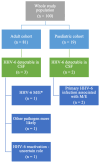Human Herpesvirus 6-A Rare Aetiologic Agent for CNS Infections in Immunocompetent Individuals or an Underestimation?
- PMID: 39200800
- PMCID: PMC11355476
- DOI: 10.3390/jcm13164660
Human Herpesvirus 6-A Rare Aetiologic Agent for CNS Infections in Immunocompetent Individuals or an Underestimation?
Abstract
Background: Human herpesvirus 6 (HHV-6) is considered a ubiquitous virus, with many countries reporting a seroprevalence of more than 80-90% among the general population. However, this virus is unique among herpesviruses in its ability to integrate into the genetic material of the host's cells. Thus, there are three ways by which HHV-6 can cause an active infection-primary infection, reactivation of a latent acquired infection, or activation of iciHHV-6 (inherited chromosomally integrated HHV-6). Whole blood quantitative polymerase chain reaction (qPCR) is very useful in distinguishing between iciHHV-6 and primary infection/reactivation. Our aim is to assess the role of HHV-6 in the aetiology of central nervous system (CNS) infections in adults and children, to describe all HHV-6-positive cases in an attempt to determine the susceptible population and to identify potential risk factors that can be linked to HHV-6 meningoencephalitis. Methods: We performed a retrospective study involving patients that were admitted to Prof. Dr. Matei Bals National Institute of Infectious Diseases, Bucharest, Romania, with a diagnosis of meningitis or encephalitis. We only selected the clinical records of patients that had a multiplex PCR Biofire® FilmArray® meningitis/encephalitis panel. Results: We report a 5% HHV-6 positivity in the cerebrospinal fluid (CSF) of patients with CNS infections tested with a commercial multiplex PCR M/E (meningitis/encephalitis) panel. Additionally, 2% to 4% of the total study population (n = 100) had active HHV-6 infections, which denotes 40 to 80% of the HHV-6-positive samples. We did not observe any statistically significant correlation between HHV-6 positivity in the CSF and variables such as age, sex, or comorbidities, including obesity, diabetes, hypertension, immunosuppression, or oncologic disease. Therefore, no risk factors could be linked with HHV-6 positivity in the CSF. Conclusions: although multiplex qualitative PCR is highly useful for providing rapid results and identifying nearly every pathogen that can cause meningitis/encephalitis, we have to be aware of this type of test's limitations. All patients with HHV-6 detectable in their CSF via a multiplex PCR test should also undergo qPCR testing from both CSF and blood to prevent over-diagnosing HHV-6 CNS infections, to avoid unnecessary antiviral treatments, and ensure the accurate identification of the true diagnosis.
Keywords: HHV-6; encephalitis; meningitis.
Conflict of interest statement
The authors declare no conflicts of interest.
Figures
Similar articles
-
[Evaluation of the Bio-Speedy Meningitis/Encephalitis Panel in the Diagnosis of Central Nervous System Infections].Mikrobiyol Bul. 2024 Jul;58(3):270-283. doi: 10.5578/mb.202497189. Mikrobiyol Bul. 2024. PMID: 39046209 Turkish.
-
Pathogen or Bystander: Clinical Significance of Detecting Human Herpesvirus 6 in Pediatric Cerebrospinal Fluid.J Clin Microbiol. 2020 Apr 23;58(5):e00313-20. doi: 10.1128/JCM.00313-20. Print 2020 Apr 23. J Clin Microbiol. 2020. PMID: 32102858 Free PMC article.
-
Molecular detection of human herpesvirus 7 DNA in cerebrospinal fluid from adult patients with neurological disorders.J Neurovirol. 2018 Jun;24(3):333-338. doi: 10.1007/s13365-018-0618-4. Epub 2018 Mar 13. J Neurovirol. 2018. PMID: 29536269
-
Human herpesvirus 6 and central nervous system disease in oncology patients: A retrospective case series and literature review.J Clin Virol. 2021 Mar;136:104740. doi: 10.1016/j.jcv.2021.104740. Epub 2021 Jan 28. J Clin Virol. 2021. PMID: 33548682 Review.
-
Roseolovirus-associated encephalitis in immunocompetent and immunocompromised individuals.J Neurovirol. 2017 Feb;23(1):1-19. doi: 10.1007/s13365-016-0473-0. Epub 2016 Aug 18. J Neurovirol. 2017. PMID: 27538995 Free PMC article. Review.
Cited by
-
A Rare Case of Human Herpesvirus 6 Meningitis in an Immunocompetent Adult Presenting With Recurrent Encephalopathy: Could Prior Head Trauma or an Incidental Cerebral Cavernous Malformation Be a Predisposing Factor?Cureus. 2025 Jul 8;17(7):e87511. doi: 10.7759/cureus.87511. eCollection 2025 Jul. Cureus. 2025. PMID: 40777686 Free PMC article.
References
-
- Al-Sadeq D.W., Zedan H.T., Aldewik N., Elkhider A., Hicazi A., Younes N., Ayoub H.H., Raddad L.A., Yassine H.M., Nasrallah G.K. Human herpes simplex virus-6 (HHV-6) detection and seroprevalence among Qatari nationals and immigrants residing in Qatar. IJID Reg. 2021;2:90–95. doi: 10.1016/j.ijregi.2021.12.005. - DOI - PMC - PubMed
-
- Arama V., Cercel A.S., Vladareanu R., Mihai C., Mihailescu R., Rankin J., Goschin S., Filipescu A., Rafila A., Arama S., et al. Type-specific herpes simplex virus-1 and herpes simplex virus-2 seroprevalence in Romania: Comparison of prevalence and risk factors in women and men. Int. J. Infect. Dis. 2010;14((Suppl. S3)):e25–e31. doi: 10.1016/j.ijid.2009.07.026. - DOI - PubMed
LinkOut - more resources
Full Text Sources



